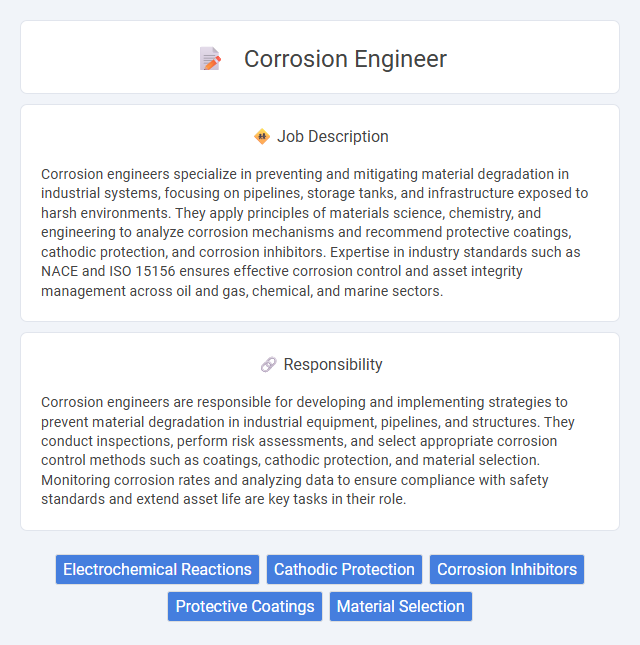
Corrosion engineers specialize in preventing and mitigating material degradation in industrial systems, focusing on pipelines, storage tanks, and infrastructure exposed to harsh environments. They apply principles of materials science, chemistry, and engineering to analyze corrosion mechanisms and recommend protective coatings, cathodic protection, and corrosion inhibitors. Expertise in industry standards such as NACE and ISO 15156 ensures effective corrosion control and asset integrity management across oil and gas, chemical, and marine sectors.
Individuals with strong analytical skills and attention to detail are likely suitable for a corrosion engineer role, as the job involves assessing material degradation and implementing prevention strategies. Those comfortable working in industrial environments and handling technical data may find this profession aligns well with their abilities. Conversely, people who prefer less technical work or lack interest in materials science might find the demands of this job challenging.
Qualification
Corrosion engineers typically require a bachelor's degree in materials science, chemical engineering, or mechanical engineering, with specialized training in corrosion control and prevention techniques. Professional certifications such as NACE CIP Level 1 or Level 2 enhance credibility and demonstrate expertise in corrosion management. Strong knowledge of metallurgy, coating systems, and corrosion monitoring tools is essential for effective job performance.
Responsibility
Corrosion engineers are responsible for developing and implementing strategies to prevent material degradation in industrial equipment, pipelines, and structures. They conduct inspections, perform risk assessments, and select appropriate corrosion control methods such as coatings, cathodic protection, and material selection. Monitoring corrosion rates and analyzing data to ensure compliance with safety standards and extend asset life are key tasks in their role.
Benefit
A career as a corrosion engineer likely offers significant financial benefits due to the specialized skill set required for preventing material degradation in various industries. Opportunities for career advancement and job stability may increase because of the ongoing need for maintenance and safety in infrastructure, oil and gas, and manufacturing sectors. Professionals in this field could also experience job satisfaction, derived from mitigating risks and extending the lifespan of critical assets.
Challenge
Corrosion engineer roles likely involve complex challenges related to predicting and preventing material degradation in harsh environments. Addressing these issues may require innovative solutions in materials selection and protective coatings. The job probably demands constant adaptation to evolving industry standards and environmental regulations.
Career Advancement
Corrosion engineers specializing in materials degradation analysis can advance their careers by gaining expertise in predictive maintenance and failure analysis technologies. Mastery of industry standards such as NACE and knowledge in advanced coatings and cathodic protection systems significantly enhance promotion prospects. Leadership roles often require skills in project management and regulatory compliance within sectors like oil and gas, infrastructure, and maritime industries.
Key Terms
Electrochemical Reactions
Corrosion engineers specialize in analyzing and mitigating electrochemical reactions that cause metal degradation in various environments. They employ techniques such as electrochemical impedance spectroscopy and potentiodynamic polarization to study corrosion mechanisms and develop protective measures like coatings and cathodic protection systems. Mastery of electrochemical principles enables corrosion engineers to extend the lifespan of infrastructure and industrial equipment by preventing material failure.
Cathodic Protection
Corrosion engineers specializing in cathodic protection design, implement, and maintain systems that prevent metal structures from deteriorating due to electrochemical reactions. They perform corrosion assessments, analyze soil and water conditions, and select appropriate anode materials to ensure the longevity of pipelines, storage tanks, and offshore platforms. Expertise in monitoring techniques like voltage measurements and current density evaluation is essential to optimize system performance and compliance with industry standards such as NACE SP0169.
Corrosion Inhibitors
Corrosion engineers specializing in corrosion inhibitors develop and apply chemical compounds that slow down or prevent the deterioration of metals in industrial environments. They analyze material compatibility and environmental factors to design effective inhibitor formulations that protect pipelines, storage tanks, and equipment from rust and chemical damage. Expertise in electrochemical testing and regulatory compliance ensures optimal inhibitor performance and extends the lifespan of critical infrastructure.
Protective Coatings
Corrosion engineers specializing in protective coatings design and implement advanced materials to prevent metal degradation in industrial environments, ensuring structural integrity and extending asset lifespan. They analyze environmental factors such as humidity, temperature, and chemical exposure to select optimal coating systems like epoxy, polyurethane, or zinc-rich primers. Expertise in inspection techniques and regulatory compliance guarantees the performance and durability of protective coatings in sectors like oil and gas, marine, and infrastructure.
Material Selection
Corrosion engineers specialize in material selection to prevent deterioration caused by chemical or electrochemical reactions between materials and their environments. They analyze factors such as temperature, humidity, and chemical exposure to recommend alloys, coatings, and protective barriers that enhance durability and safety. Optimizing material selection reduces maintenance costs and extends the lifespan of infrastructure across industries such as oil and gas, marine, and construction.
 kuljobs.com
kuljobs.com